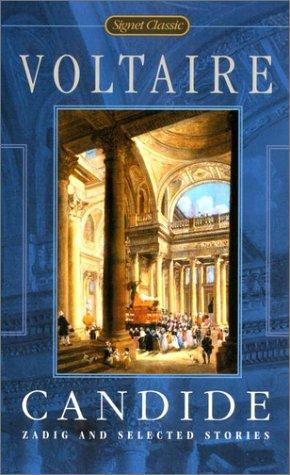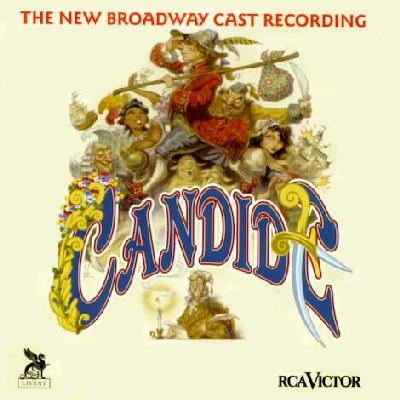
Candide, ou l'Optimisme (pronounced /ˌkænˈdiːd/ in English and [kɑ̃ˈdid] in French) is a French satire written in 1759 by Voltaire, a philosopher of the Age of Enlightenment. The novella has been widely translated, with English versions titled Candide: or, All for the Best (1759); Candide: or, The Optimist (1762); and Candide: or, Optimism (1947).[5] The novella begins with a young man, Candide, who is living a sheltered life in an Edenic paradise and being indoctrinated with Leibnizian optimism (or simply optimism) by his mentor, Pangloss. The work describes the abrupt cessation of this lifestyle, followed by Candide's slow, painful disillusionment as he witnesses and experiences great hardships in the world. Voltaire concludes with Candide, if not outright rejecting optimism, advocating an enigmatic precept, "we must cultivate our garden", in lieu of the Leibnizian mantra of Pangloss, "all is for the best in the best of all possible worlds".
Candide is characterized by its sarcastic tone and its erratic, fantastical, and fast-moving plot. A picaresque novel with a story similar to that of a more serious bildungsroman, it parodies many adventure and romance clichés, the struggles of which are caricatured in a tone that is mordantly matter-of-fact. Still, the events discussed are often based on historical happenings, such as the Seven Years' War and the 1755 Lisbon earthquake.[6] As philosophers of Voltaire's day contended with the problem of evil, so too does Candide in this short novel, albeit more directly and humorously. Voltaire ridicules religion, theologians, governments, armies, philosophies, and philosophers through allegory; most conspicuously, he assaults Leibniz and his optimism.[7][
Source:
http://en.wikipedia.org/wiki/Candide
Candide, The Operetta

Candide (1956) is an operetta with music composed by Leonard Bernstein , based on the novella of the same name by Voltaire. The original libretto was written by Lillian Hellman, but since 1974, has been generally performed with a book by Hugh Wheeler, which is more faithful to Voltaire's novel. [1] The primary lyricist was the poet Richard Wilbur. Other contributors to the text were John Latouche, Dorothy Parker, Lillian Hellman, Stephen Sondheim, and Leonard Bernstein. Hershy Kay, John Mauceri, and Maurice Peress contributed orchestrations.
Candide first opened on Broadway as a musical on 1 December 1956. The premier production was directed by Tyrone Guthrie and conducted by Samuel Krachmalnick.[101] While this production was a box office flop, the music was highly praised, and an original cast album was made. The album gradually became a cult hit, but Hellman's libretto was criticised as being too serious an adaptation of Voltaire's novel. [102] Candide would be more popular seventeen years later with a new libretto by Hugh Wheeler.
Source:
http://en.wikipedia.org/wiki/Candide


Candide says they will buy a farm and cast aside wondering about the meaning of a meaningless world. They will fulfill their natural function working God's earth from dawn to dusk ("Make Our Garden Grow").
A cow appears, as Candide, Cunegonde, and the company in rustic clothes pick up pitchforks, buckets, and other farm implements. The company sings that Eden can't be found; the sweetest flowers and the fairest trees are grown in solid ground. They explain:
- We're neither pure nor wise nor good.
- We'll do the best we know.
- We'll build our house and chop our wood.
- And make our garden grow.
As they lift their grateful eyes to God, the cow drops dead of the pox and Dr. Voltaire, back in nightshirt, exclaims "Ah, Me, The Pox" and draws the curtain.
CANDIDE
You've been a fool
And so have I,
But come and be my wife.
And let us try,
Before we die,
To make some sense of life.
We're neither pure, nor wise, nor good
We'll do the best we know.
We'll build our house and chop our wood
And make our garden grow...
And make our garden grow.
CUNEGONDE
I thought the world
Was sugar cake
For so our master said.
But, now I'll teach
My hands to bake
Our loaf of daily bread.
CANDIDE AND CUNEGONDE
We're neither pure, nor wise, nor good
We'll do the best we know.
We'll build our house and chop our wood
And make our garden grow...
And make our garden grow.
(ensemble enters in gardening gear and a cow walks on)
CANDIDE, CUNEGONDE, MAXIMILLIAN, PAQUETTE, OLD LADY, DR. PANGLOSS
Let dreamers dream
What worlds they please
Those Edens can't be found.
The sweetest flowers,
The fairest trees
Are grown in solid ground.
ENSEMBLE (a cappella)
We're neither pure, nor wise, nor good
We'll do the best we know.
We'll build our house and chop our wood
And make our garden grow.
And make our garden grow!
(The cow dies)
VOLTAIRE
Ah, me! The pox!





1997 Broadway Revival, The Gershwin Theater
--
Together, we can change the world, one mind at a time.
Have a great day,
Tommy
--
Together, we can change the world, one mind at a time.
Have a great day,
Tommy
__._,_.___

No comments:
Post a Comment